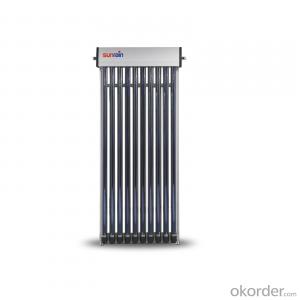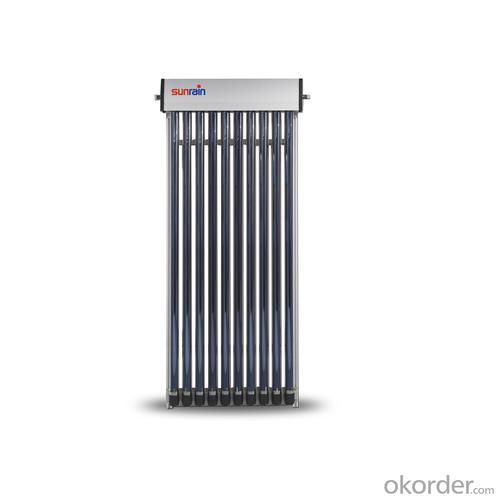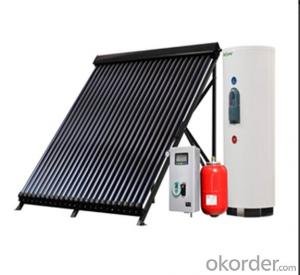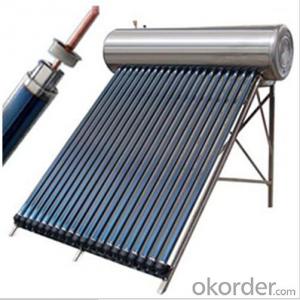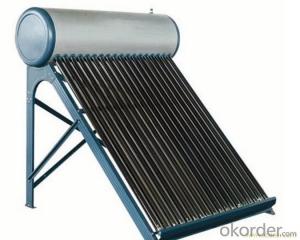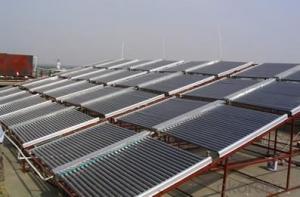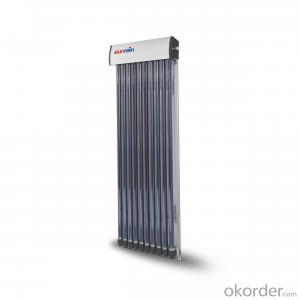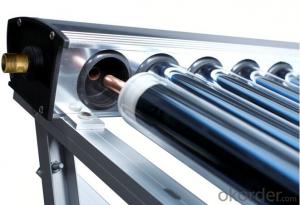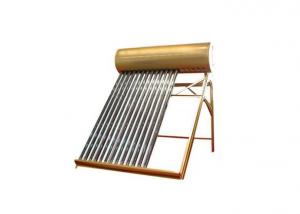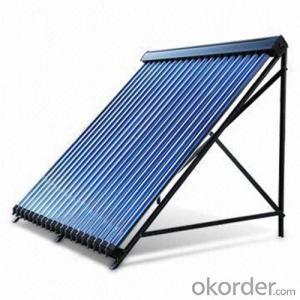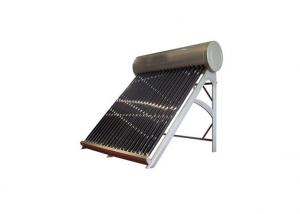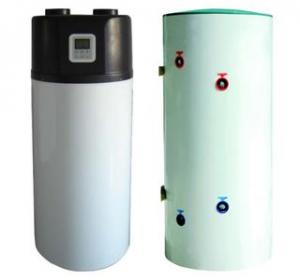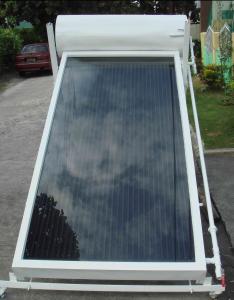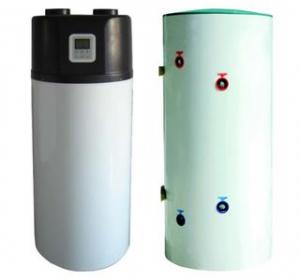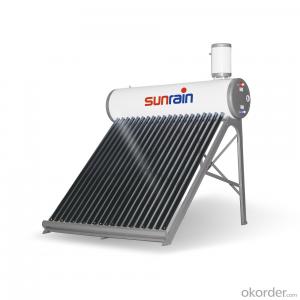Heat Pipe Collector R1 Heating Element for Solar Water Heater
- Loading Port:
- China Main Port
- Payment Terms:
- TT OR LC
- Min Order Qty:
- -
- Supply Capability:
- -
OKorder Service Pledge
OKorder Financial Service
You Might Also Like
* Heat pipe - offer low maintenance
* No water in the vacuum tubes, no freezing problem in winter, can be used in cold area. One broken tube will not affect the function of the system.
* 3 years warranty, 20+ years lifespan
* Market leading efficiency/output
* Triple layer selective absorber coating, absorption coefficient >94%
* Evacuated tube outer tube thickness >1.8mm
* 24mm high conductivity heat pipe condenser, Nick-coated condenser surface.
* Aluminum frame, strong structure, light weight.
* High and constant pressure of polyurethane foaming technology ensure the outstanding insulation quality.
- Q: How does a solar water heater work?
- A solar water heater works by harnessing the energy from sunlight to heat water. It consists of a collector, typically mounted on a roof, which absorbs the sunlight and transfers the heat to a fluid, usually water or a mix of water and antifreeze. This heated fluid is then circulated through pipes or tubes, transferring its heat to the water stored in a tank. The heated water can be used for various purposes like bathing, washing, or heating the space. By using renewable solar energy, these systems can reduce the reliance on traditional energy sources and lower energy costs.
- Q: What is the expected energy savings from using a solar water heater?
- The expected energy savings from using a solar water heater can vary depending on various factors such as the size and efficiency of the system, local climate conditions, and the amount of hot water usage. However, on average, it is estimated that a solar water heater can save between 50-80% of the energy typically used for heating water, resulting in significant cost savings and reduced environmental impact.
- Q: Can a solar water heater be used in areas with high seismic activity?
- Yes, a solar water heater can be used in areas with high seismic activity. However, it is crucial to ensure that the system is properly designed and installed to withstand seismic forces. Reinforcements and anchoring mechanisms may be required to secure the solar water heater and prevent damage during earthquakes. Additionally, regular inspections and maintenance should be conducted to ensure the system remains stable and safe in seismic-prone areas.
- Q: How much water can a solar water heater store at a time?
- The amount of water a solar water heater can store at a time depends on the size and capacity of the specific system. Solar water heaters typically come in different sizes and storage capacities, ranging from small residential systems to larger commercial ones. For a residential solar water heater, the storage tank can typically hold anywhere from 40 to 120 gallons (150 to 450 liters) of water. This is usually sufficient to meet the hot water needs of a household, although it may vary depending on the number of occupants and their usage habits. On the other hand, commercial solar water heaters can store significantly larger volumes of water. These systems are designed to cater to higher demand, such as in hotels, hospitals, or large-scale industrial applications. Commercial solar water heaters can store hundreds or even thousands of gallons (thousands or tens of thousands of liters) of water, depending on the specific requirements of the establishment. It's important to note that the stored water in a solar water heater is typically pre-heated by the sun's energy before being used. When hot water is consumed, cold water from the mains supply enters the system and replaces the hot water that has been used, allowing the solar water heater to continuously provide hot water.
- Q: How does a solar water heater affect the resale value of a home?
- A solar water heater can positively impact the resale value of a home. As an eco-friendly and cost-effective addition, it demonstrates the home's energy efficiency and sustainability. Potential buyers are often attracted to properties with renewable energy technologies, which can help increase the overall desirability and marketability of the home.
- Q: What is the expected energy production of a solar water heater?
- The expected energy production of a solar water heater varies depending on various factors such as the size and efficiency of the system, local climate conditions, and usage patterns. On average, a well-designed solar water heater can provide around 50-80% of a household's hot water needs throughout the year.
- Q: The solar water heater without water becomes bad
- Vacuum tube solar water heater with high efficiency in the summer, sunny weather conditions, less than two days water temperature can reach the boiling point, if a long time without water, such as travel, tourism, to make the water a long time at high temperature and high pressure conditions, will accelerate the aging of the sealing ring, accelerated aging, polyurethane shrink, sometimes not exhaust smooth, too much pressure will make the tank expansion bad, will shorten the life of furring, water tank. Therefore, if you are not at home for a long time, you should arrange for others to put hot water on the cold water, or in the vacuum tube collector placed on the cover to block the sun, to go home, and then remove. If you do not use it for a long time, you need to cancel the electric heating setting to avoid wasting electricity
- Q: Can a solar water heater be used in areas with limited solar radiation?
- Yes, a solar water heater can still be used in areas with limited solar radiation. While solar water heaters are most effective in areas with abundant sunlight, they can still provide some level of heating even in areas with limited solar radiation. However, the efficiency and effectiveness of the system may be reduced, resulting in slower or less efficient heating of the water. In such cases, it may be necessary to supplement the solar water heater with an alternative heating source to ensure a consistent supply of hot water.
- Q: Can a solar water heater be used in areas with limited access to water resources or water scarcity?
- Yes, a solar water heater can be used in areas with limited access to water resources or water scarcity. Solar water heaters are designed to efficiently heat water using sunlight as the primary energy source. They can be a sustainable and cost-effective solution in areas where water scarcity is a concern, as they reduce the reliance on traditional water sources such as electricity or fossil fuels. Additionally, solar water heaters can also be integrated with rainwater harvesting systems, further optimizing water usage in these areas.
- Q: How does the efficiency of a solar water heater compare to an electric water heater?
- The efficiency of a solar water heater is generally higher than that of an electric water heater. Solar water heaters utilize renewable energy from the sun to heat water, which is a more sustainable and cost-effective option in the long run. On the other hand, electric water heaters rely on electricity which is often generated from non-renewable sources, resulting in higher energy consumption and associated costs. Additionally, solar water heaters can be designed to store thermal energy for use during cloudy periods, improving their overall efficiency.
Send your message to us
Heat Pipe Collector R1 Heating Element for Solar Water Heater
- Loading Port:
- China Main Port
- Payment Terms:
- TT OR LC
- Min Order Qty:
- -
- Supply Capability:
- -
OKorder Service Pledge
OKorder Financial Service
Similar products
Hot products
Hot Searches
Related keywords
